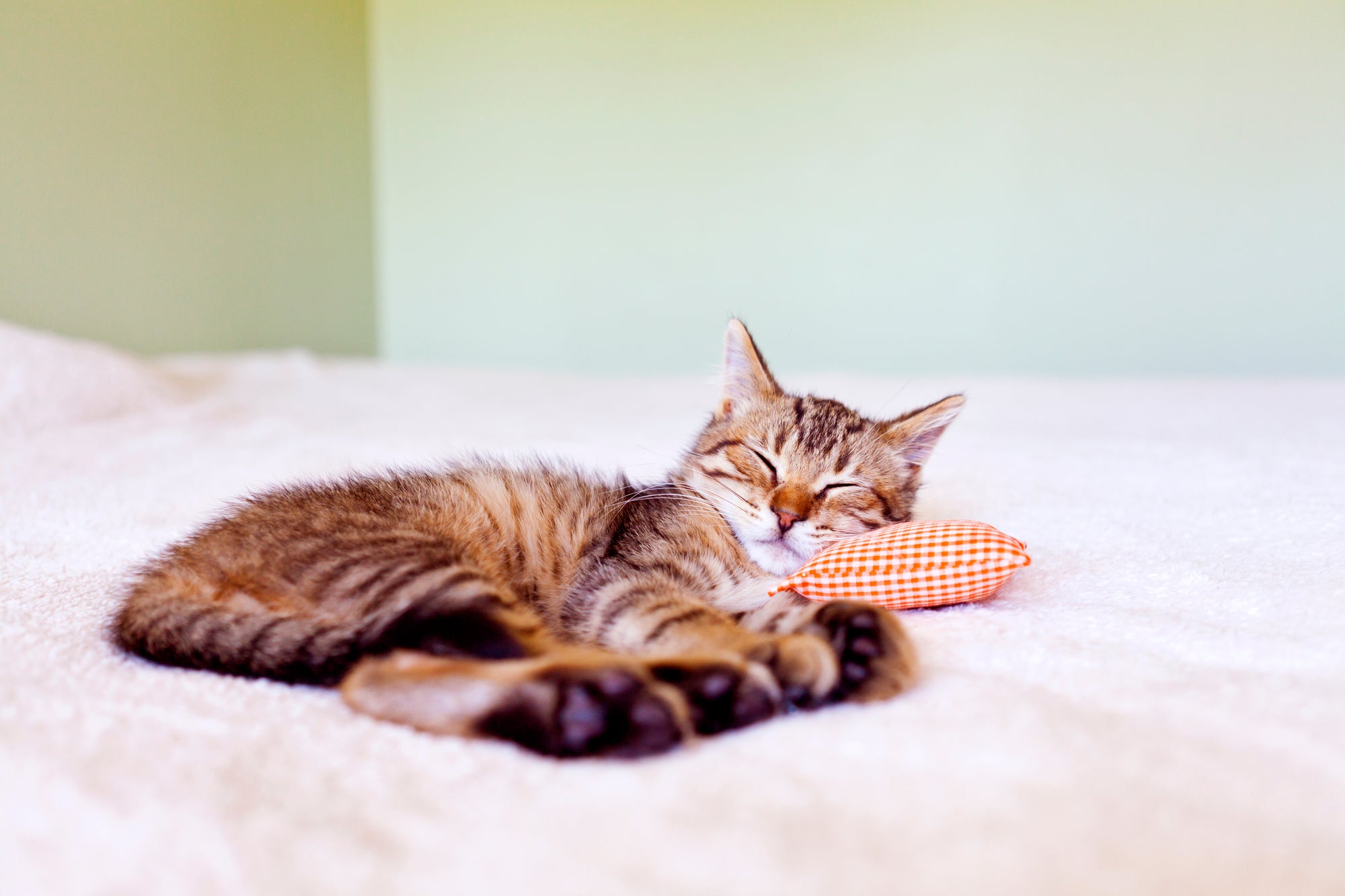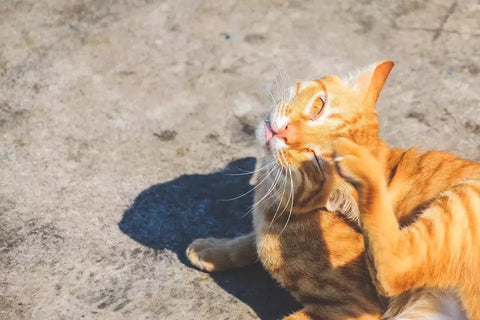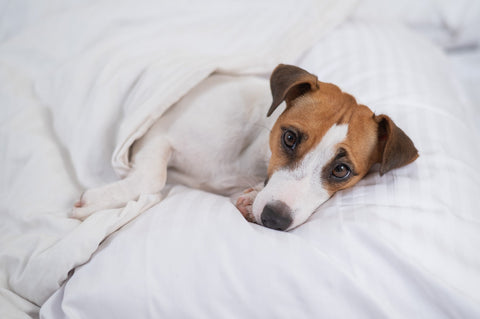Every pet has its own personality – especially cats! Some cats are free-spirited, some are outgoing, some are mischievous, but when your cat that’s all fun-loving suddenly becomes socially-distant, quiet, and aloof, this might raise some concerns: cat depression and cat sadness.
Is My Cat Depressed?
Do cats get depressed? Unfortunately, cats can suffer from depression. Most pet parents do not know the reason for cat sadness and why their cats suddenly become depressed. In this article, we will help you identify the signs and causes of cat sadness and cat depression and learn the best action plan how to make a sad cat happy again for the rest of their nine lives.
Signs of Cat Depression and Cat Sadness
The sudden change of behavior and personality of your cat means a lot of things and pet parents will begin to ask “Is my cat depressed?”. Listed are the tell-tale signs your cat may be dealing with cat depression.
"The noises your cat makes are vocal clues that they may be unhappy. A cat’s unhappy noise is usually low-pitched yowls or purrs that sound distressing."
Use these tips to know how to tell if a cat is sad. One or more of the items mentioned above can be signs of cat sadness and depression. If you notice these, you will want to find the possible reasons and how to make a sad cat happy again.

Why Your Cat is Depressed
Knowing why your cat is sad and depressed is the first step to be able to know how you can manage cat depression. As American Society for the Prevention of Cruelty to Animals® states, depression in cats is often your cat’s response to certain changes in their life, even if it seems like small things.
You might be wondering, “Why is my cat sad?” There can be many possible reasons why your cat is depressed. Here are some of the reasons:
- Stress and anxiety. Cats are routine-loving animals. They love sticking to plans and if these plans are disrupted, they easily become stressed out and may suffer from cat anxiety that later on develops into depression.
- Underlying illness. Your cat may be depressed because they are in pain because of an illness. They may not play or move around like the way they used to. Conditions that cause pain in cats include upper respiratory diseases, fatty liver disease, hypothyroidism, dental problems, and many other pressing and life-threatening diseases. If you think your cat is depressed because they are sick and in pain, bring you furbaby to the vet immediately for proper diagnosis and treatment plan.
- Traumas and injuries. Trauma and injuries prohibit your cat from moving freely and doing the things they love to. Trauma and injuries cause intense discomfort, and lingering pain, and may cause depression in cats.
- Loss of a loved one. Losing a loved one is tough for almost all of us, including your cat. So, when a member of the family (whether a human family member or a fellow pet) moves out or passes away, your cat may mourn and may become depressed.
- New family members. Opposite to what's stated above, your cat may also become depressed if there are new additions in the family - especially if your cat is so used to being the center of attention then suddenly a baby, a pet dog, or another pet cat comes into the picture.
- Human emotions. Can cats sense depression and anxiety in humans? Actually, they can. Research has indicated that cats can indeed sense anxiety, depression, and other emotional cues from their pet parents.
- Seasonal Affective Disorder. Can cats get seasonal depression? Just like pet parents, cats can have seasonal affective disorder, also known as seasonal depression. If you notice your cat starts acting differently as soon as the weather changes, there is a chance your furbaby is experiencing seasonal depression.
Other possible causes of cat depression may include:
- Stray cats in the area
- Pet parents going out on a vacation or not going home for periods of time
- Pet parents not having enough bonding time with the cat
- Family disturbance, such as constant fights, divorce, etc.
- New pet parents (if the cat has been surrendered to the shelter and is newly adopted)


Ways to Manage Cat Depression
Restore your cat’s routine
Since cats love routines and certainties, make sure you are able to slowly re-establish their day-to-day cycle and the activities they are used to. Feed your cat on time, play with your cat on time, and do many other things on time.
Try to fill in your cat’s longing for somebody
A cat who has recently lost a loved one (either a human or a fellow furbaby) is confused and longing. Your furbaby may also be feeling a surge of separation anxiety as to why something so close to them is suddenly gone. To help fill in this gap, make sure you make time for your cat and give them attention, snuggle with your cat more, and give your cat the attention they most especially need. This will help comfort and reassure your furbaby that everything’s going to be okay.
Keep an upbeat attitude with your cat
Sometimes, a sad cat will behave in ways that can be frustrating. Spraying, scratching, and other signs of sadness can lead to messes and unpleasant surprises for pet parents. However, it is important not to punish or yell at your cat while they are feeling down. Instead, take some preventive measures to help both yourself and your cat through this time.
Give your sad cat activities
Cats are very curious, so it is not good for them to be bored. You can provide your cat with a Forager™ Mat or Forager™ Bowl for their dry food to provide mental stimulation. These are premium snuffle mats and bowls that are meant to hide dry food for an interactive activity for your cat. Being able to snuffle through the mat or bowl will stimulate your cat's brain and entertain them with a rewarding experience. This will help prevent boredom and fulfill your cat's enrichment needs.
How Can Pet Parents® Help a Depressed Cat?
A depressed and unhappy cat will be prone to cat spraying, resulting in you being unhappy, too. To be able to prevent your cat from spraying in inappropriate places, have them wear premium cat diapers like the ones from Pet Parents®.
Pet Parents® washable cat diapers are made to avert peeing and pooping accidents from turning into messy cleanups (and keeping you sane!). These diapers for cats are best for your depressed furbaby who is constantly spraying and peeing on places they shouldn’t.
Made with soft non-abrasive WickQuick® proprietary fabric, these diapers for cats wick away liquid fast to prevent your furbaby from developing diaper rash and urine burns. Pet Parents® washable cat diapers also have elastic tail-holes that are tailor-made for our bushy furbabies, allowing stretch and comfiness on the tail area but not enough for leaks.
Additionally, Pet Parents® Pawtect® Pads are your best choice as they can’t be shredded easily by sharp claws or scratching. They are reusable, and overall much more efficient and versatile than disposable pee pads. We know you hate the strong odor of the litter box caused by your cat’s urine not completely “hitting” the bullseye.
Pee pads placed under litter boxes are intended to catch any “misses” while its odor-eliminating property removes or lightens any unpleasant smell; becoming the ultimate lifesaver for when dealing with this issue.
Depression in cats is a real thing and must not be taken lightly. If you are wondering, “Is my cat depressed” look out for the signs that your cat is sad. Then, you can help identify what is causing Our cats feel sad, too, and as pet parents, it is our responsibility to make them feel loved, healthier, and happier in all of their nine lives.









